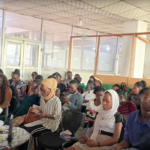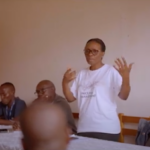
Agribusiness Development Centre Launches a Business Accelerator Program (BAP)
Agribusiness Development Centre powered by dfcu limited and Rabo foundation has today launched a Business Accelerator Program (BAP) that will attract Agribusinesses getting out of ideation phase and offer them a business acceleration opportunity which should enable these enterprises to attract markets and funding for growth and sustainability of their operations.
BAP will enable 350 agribusinesses (40% women-led) to become self-sufficient & create at least 350 new jobs, Link at least 50% of these agribusinesses to financing and markets.
The program aims to link at least 50 of these businesses to affordable Green Finance and technical assistance. The objective of this partnership is to be able to collectively contribute directly to the five SDGs: 5- Gender equality; 7 – Affordable Clean Energy; 8-Decent work and economic growth; and 17- Partnerships for goals.
Mathias Katamba, dfcu Bank CEO noted that dfcu has worked closely with ADC to create the Business Accelerator Program whose main objectives is to support business improvements and facilitate the necessary linkages for growth and sustainability.
“Since its inception, dfcu Bank has made continuous commitments to support a wide base of customers that include; SMEs, women entrepreneurs, Investment Clubs. Our partnership with ADC is part of a joint mission to grow, build and promote the prospect of a sustainable future. Agribusiness is the future of Uganda, and this partnership will help us continue to fulfill our commitment to serve and build this sector.”
The program cohorts shall be thematic to consider varied hindrances to agribusiness growth as well as harness opportunities for business acceleration. The themes under consideration over two years, shall be; key value chains; greening agribusinesses; Oil & Gas opportunities for Agribusinesses; Youth in agribusiness with the first cohort premised on a theme of gender inclusivity in agribusiness development.
“We hope to Influence youth& women inclusivity in the leadership of at least 50% businesses at the end of the program. The learners will also be exposed to peer and networking opportunities through learning visits to experts in varied fields.” Josephine Mukumbya, Executive Director, ADC.
Why the “Women in Agribusiness” as the first cohort?
Women make up to 52% of the labour force and are an important talent to help Uganda meet its development goals especially in entrepreneurship and micro, small and medium enterprises growth. However, it is generally known that women face more challenges than men in starting, managing, and growing their enterprises as they are more likely to be impeded by a lack of the necessary capacities, skills, and resources. They are more disadvantaged than men due to legal impediments and others.
Therefore, a Business Acceleration Program (BAP) targeted for women-led agribusinesses will build their capacity and investment readiness to access financing from investors and financial institutions.
Promoting entrepreneurship and innovation coupled with the growth of Agri-SMEs will help women develop greater economic prosperity. With the training experience and unique position of ADC having dfcu Limited and Rabo Foundation as their member partners, we believe it will open more opportunities for the women led agribusinesses under the first cohort which is now open on all online channels of ADC and dfcu.
Application submission:Eligible candidates should submit their applications by using the special form available on websites: www.adc.ug/ www.dfcugroup.com or use link www.soma.adc.ug/bap to provide the following information/documents.
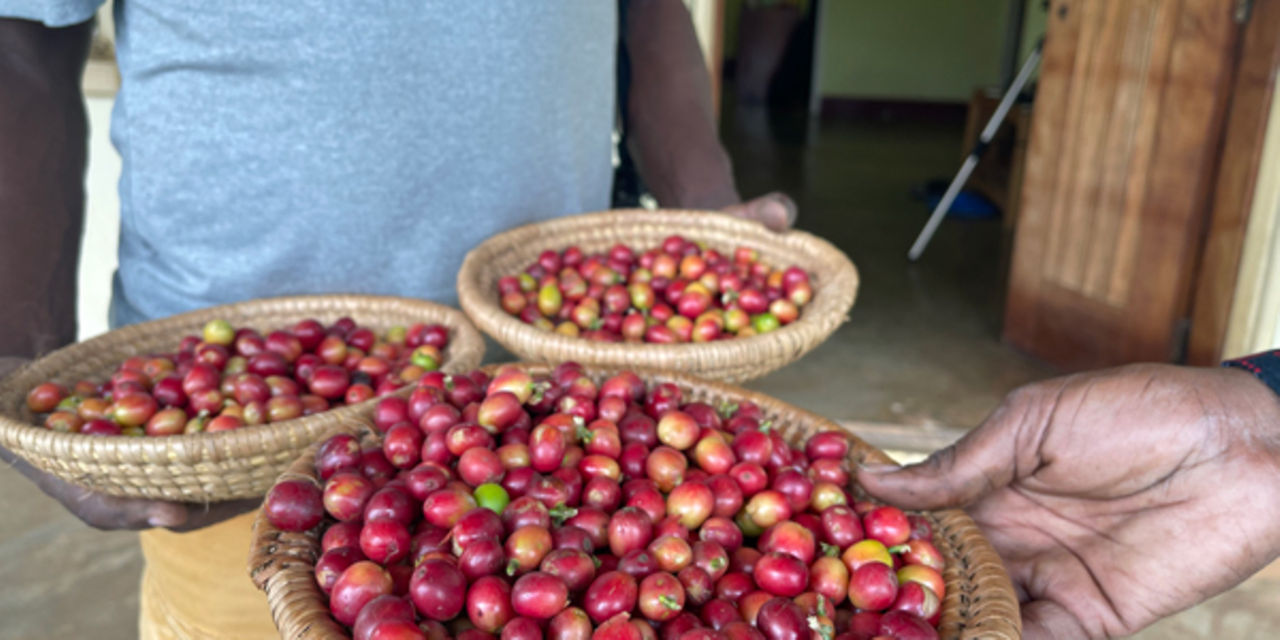
UCDA equips farmers with coffee export skills
Coffee business has been in the news lately. Stakeholders in the coffee sector met at Coffee City in Ntinda a Kampala suburb to deliberate on ways local players can bolster their participation in the sector.
“Over time, our coffee sector has become dominated by multinationals. They control 80 percent of the coffee export volume and Ugandan cooperatives control 10 percent volume. We have organised the price risk management workshop to address that and see how Ugandan organisations and cooperatives can improve the export market,” says Wilber Kayinga, a business advisor at Agribusiness Development Centre (ADC), a farmer based organisation that promotes sustainable agriculture.
Farmers and cooperatives members were equipped with monitoring skills and how best they can secure good contracts, fix good prices and export to big buyers on the international market.
Export figures
According to James Kizito- Mayanja, the Uganda Coffee Development Association’s (UCDA) market intelligence and information officer, the country exported 6.1 million 60 kilogramme bags in green form.
Uganda has two coffee seasons, in March/April and in September. The major take-aways from the workshop for Stephen Mugoya, a finance manager with Ankole Coffee Producers Cooperative Union in Kabwohe, Sheema District, were the importance of coffee farmers sharing experience on how the seasons went because the September season was a competitive one.
“There was stiff competitive for the crop. We have also learnt from each other on strategies we need to take to mitigate risks of trade in coffee. I am confident of leaving richer because I have been contacted of local and international buyers. The facilitators training us do a lot of research and benefit from their knowledge of what global trends are,” Mugoya explains.
Export promotion
President Museveni has tasked UCDA which is mandated to promote and add value to the beverage, to up the exportation volumes to 20 million 60 kilogrammes bags.
Uganda exports the graded green coffee berry. According to the International Coffee Organisation (ICO), an intergovernmental organisation for coffee, global exports of green beans in March 2022 totalled 11.79 million 60kg bags, compared with 11.48 million bags in the same month of the previous year, up 2.6 percent.
The Brazilian Naturals and Robustas were the main forces behind the increase, shipping 3.58 million bags and 4.65 million bags of green beans in March 2022 as compared with 3.44 million bags and 4.31 million bags in March 2021, respectively, up 3.9 percent and 7.8 percent.
80 percent of the coffee produced in Uganda, is Robusta and 20 Arabica. Robusta coffee is of high value and popularly blended by top roasters around the world given its rich aroma.
Market intelligence
According to Mayanja, they are in the process of profiling coffee as per the district or area it is grown just the way Ethiopians do as a way of attracting and attaching a higher price.
At a recent training workshop on price risk management organised under the auspices ADC, Kizito’s two cents were the need to build and strengthen cooperatives.
Markets are driven by prices and for any business, there is some level of risk but the farmer or anyone in coffee business would need to know how to deal with or avert risks should they encounter them.
Mugoya, says that sharing strategies will go a long way in mitigating risks of trade in coffee.
Agronomy
In establishing a coffee farm, UCDA advises that a farmer needs to space the trees, Robusta plants is 10 feet by 10 feet and between Arabica ones is eight by eight feet.
You are then required to dig the right size of holes – two by two feet long and wide and four feet deep. While digging holes, heap the top soil on one side and bottom soil on another side and add manure to the dug-out soil and return it into the holes.
Mark the centre of the holes and leave them for two to three months before planting then obtain coffee plantlets from Certified Coffee Nurseries. During the planting season, UCDA tips that you can plant very early in the morning or late in the evening.
You will need to remove the polythene pot cover before planting the seedling/cutting and provide temporary shade to the newly planted coffee plantlets and water in case of water stress. Water conservation channels are important in coffee. When the coffee plantlets have attained a height of about one and a half foot or six to nine months after planting, they should be trained, that is bent in an east to west direction where the sun rises or sets to initiate multiple branches from which the lowest and most healthy two are selected and maintained together with the original plantlet. This ensures higher yield and profitability per tree.
The coffee garden should always be mulched and free of weeds. Beans and bananas are good intercrops for coffee. Continuous de-suckering of the coffee plants should be practiced preventing development of a microclimate that encourages pests such as Black Coffee Twig Borer (BCTB).

UCA, ADC partner to extend education to cooperatives
The Uganda Cooperative Alliance (UCA) Limited has signed a Memorandum of Understanding with the Agribusiness Development Center (ADC) to provide capacity building to cooperatives in the country.
The scheme places prime focus on capacity building which will involve training in among others content generation and development, joint proposal writing for successful resource mobilization, monitoring, and evaluation.
The General Secretary of Uganda Cooperative Alliance Limited, Mr. Ivan Asiimwe decried the lack of information and added that the friendship is timely and it has come at a time when some cooperatives and SACCOs are facing leadership challenges.
“To run a cooperative successfully, then education and information must flow in the system, everybody needs to be educated on the responsibilities to be able to catch up with change,” Mr. Asiimwe said.
He justified the need for constant education as it will enable cooperatives to be self-efficient, run smoothly, and social empowerment of cooperatives in Uganda.
“If members in a cooperative are well equipped with knowledge regarding the cooperative laws, policies, regulations, bylaws values and principles they will be able to contribute more effectively to cooperatives,” he said.
In a rejoinder, the Excitative Director Agribusiness Development Centre (ADC)
Ms. Josephine Mukumbya said that the partnership has come at a time when there is a need to restart the Agricultural sector since it is the back born of Uganda’s economy.
“We see promoting self-sufficiency as an effective tool to transforming the Agricultural Sector in Uganda, It is better to teach them how to fish than giving the fish for s day” Ms. Mukumbya said.
She also decried the leadership problem faced by cooperatives and saving societies.
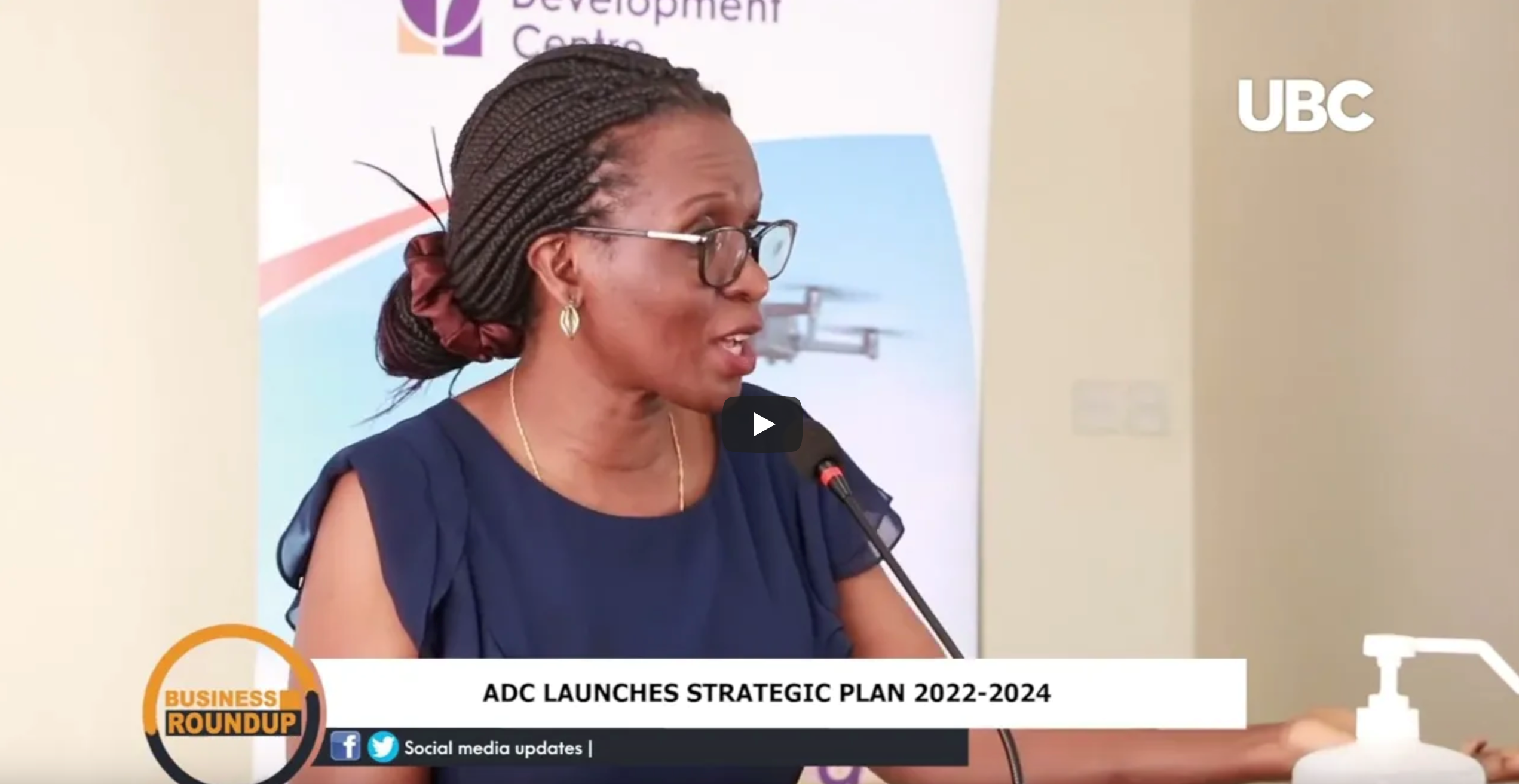
Agribusiness Development Centre launches new strategic plan
The Agribusiness Development Centre (ADC), a financial literacy training centre for Farmer Based Organisations (FBOs) has put together a 3-year work-plan that seeks to improve social entrepreneurship.The strategic plan launched on Thursday June 2, according to Ms. Josephine Mukumbya, the ADC Executive Director, will be a big boost in the area of job creation and increased income generation, while enhancing the much sought-after social economic transformation.
“We plan increase our investment in the whole agricultural value chain by supporting groups and farmers on the best financial management, agronomy, price risk management, value addition and export procedures while addressing their financial needs,” she said, emphasising that ADC’s capacity building interventions in the agricultural sector was necessary given the current high levels of unemployment.
Ms. Mukumbya was speaking to reporters after presenting the strategic plan to a group of stakeholders during an event held at dfcu head offices in Kampala.
The Agribusiness Development Centre was initiated in 2017 and is powered by the Rabo Foundation and dfcu Bank.
“If we give the knowledge in areas of record keeping, financial literacy, especially financial management in areas of agronomic practices, we should be able to see more of youth engaged in this area. We should even give them the information, guidance and incentives that actually pull them to be engaged in this sector. We are looking at having a quarter of a million in terms of beneficiaries by the end of the strategic plan and we are looking at over 1000 direct jobs right from the enterprises themselves,” Ms. Mukumbya said.
In the 2022 – 2024 strategic investment plan, ADC plans to support business in Cocoa and Coffee, Banana, cereals and oilseeds, Dairy and Livestock in areas of value addition, mixed cropping, export and market changing dynamics.
“We want to increase income and we are targeting to see a 10% increase over the next three years,” Mukumbya said.
Women and youth
“For at least 50% of the trained parties, we will want to see women and youth well included. We want to see that there’s more women in leadership, a percentage of 30% is what we’re looking at. We are currently showing baselines that are under 10%. In that regard, we want to introduce green financing. We are starting humbly but we believe this is an area that has so much potential for growth. A number of enterprises that would want to link through our business accelerator programs are identified. And in terms of self sufficiency, if 50% of the trained enterprises are self sufficient, we envisage leveraging over 10 fold and want to look at about USD 30 million in funding towards them, ” Ms. Mukumbya said, noting that the agricultural sector in Uganda can only be transformed through innovation and collaboration.
Mr. James Ssemwanga, an agronomist and a board member of ADC, said the three-year strategic plan is designed to leverage the funding from current funders to mobilize some more to scale and sustain operations for deeper impact.
“ADC’s ambition is to achieve a growth trajectory in the medium and long term by continuing to build capacity that delivers financial, social and environmental benefits to her target customer segment,” Mr. Ssemwanga said.
On his part, Mr. Mathias Katamba, the managing director and chief executive officer of dfcu Bank said: “We are responding to government call to the private sector to support agriculture. One of the ways we are doing it is through our partnership with Rado Bank and ADC aimed at transforming agricultural sector”.
Katamba said Agriculture is one of the leading employers of Ugandans and that there’s a need for collective effort to support it.
“By facilitating ADC in its operations, dfcu Bank and Rabo bank are building capacity for the farmers to access much needed financial services,” he said, adding that:
“dfcu Bank will continue to provide tailor-made products for the farmers and with the capacity building delivered through ADC, the small holder farmers will be more eligible for financing from commercial banks. They will also be better placed to increase productivity and possibly embrace commercial farming which is more profitable at household and national level,” he added.
ADC envisions promoting self-sufficiency as an effective tool to transform the agricultural sector in Uganda. This can be achieved by strengthening Farmer Based Organizations in respect of efficiency and creating economies of scale, in order to make them profitable, sustainable and bankable enterprises that are able to provide efficient and effective services to their farmers.
Monitoring, Evaluation & Learning Officer [Entry Level]
BACKGROUND
Agribusiness Development Centre (ADC: www.adc.ug) is a company limited by Guarantee established in 2017 through a partnership between dfcu Bank (Uganda) and Rabo Foundation (Netherlands) (ADC Investment members).
ADC drives value through a tailored capacity enhancement model focused on 4 key thematic areas and supplement cross cutting themes. ADC’s four thematic areas include:
- Organizational strengthening. Strengthen governance structure and accountability systems through training in governance and leadership.
- Financial management. Strengthen management skills of FBOs in general principles of financial literacy through training in financial literacy.
- Improved access to markets. Strengthen marketing capacity of FBOs.
- Price Risk Management: Equipping Coffee and Cocoa FBOs with knowledge tools, and skills to understand and mitigate price risks in the international market.
And Cross cutting themes:
- Gender and youth
- Green growth
- Integration of good agronomy practices
Vision
The preferred partner in promoting Self Sufficiency in target customer segments towards Agricultural Transformation in Uganda.
Mission
We offer our chosen market segment capacity building, business accelerator opportunities and facilitate relevant linkages through innovations and collaborations to grow, build and promote a prospect of a sustainable future.
Core Values
ADC is committed to upholding the following values:
- Client Value Creation– Empowering clients to become high performers in their enterprises.
- Respect for the Individual– Valuing diversity and unique contributions.
- Innovativeness-New technologies, approaches, and creating viable solutions for clients.
- Integrity – Remaining ethically steadfast to inspire trust.
- Sustainability– Building resilient and self-sufficient enterprises.
- Professionalism-Building, collaboration and learning for exceptional service delivery.
POSITION SUMMARY
ADC is seeking a qualified candidate for the position of Monitoring, Evaluation and Learning Officer (ME&L Officer).
Under the overall direction of the Monitoring, Evaluation & Learning Manager, the ME&L Officer will work with the programme team to support implementation of the M&E function, and data management systems. This includes working closely with the other technical staff in ensuring timely, data collection, validation, documentation, analysis and dissemination of information to track progress and support delivery of ADC’s Strategic Objectives.
The ME&L Officer will support monitoring of field activities and resource utilization on a regular basis to ensure efficiency, effective implementation and coherence of team activity plans to approved budgets.
The ME&L Officer will be support in the aggregation and development of high-quality reports including monthly, quarterly and annual activity reports from the different departments and regional advisors as well as Field Monitoring and subsequent Assessments.
M&E Officer is expected to maintain the ADC Monitoring and Evaluation System/database, and will be responsible for the collection, validation, collation, analysis documentation and storage of different datasets in relation to the programme activities.
The ME&L Officer will be stationed at the ADC Head Office in Kampala to serve the ADC across the country with frequent travel to the field.
Roles and Responsibilities
Under direct supervision of the Monitoring, Evaluation and Learning Manager, the ME&L officer will have the following duties and responsibilities:
PROJECT PLANNING AND IMPLEMENTATION
- Support in the development of detailed workplans for the ME&L department to foster efficiency and effectiveness.
- Ensure Timely delivery of planned project activities by identifying and documenting challenges, lessons learned and adjusting as needed to ensure success.
- Provide Support to the ME&L Manager in capacity development of the team and agents in the Monitoring and Evaluation function through identifying capacity needs for Quality report writing, research, data entry, analysis and management, and system management among others.
- Contribute to the refinement of ADC onboarding and data collection tools
MANAGING PROJECT RESOURCES
Provide support in the Monitoring of expenditures of the department, and of field-based teams including agents to ensure compliance with approved budgets and enhance cost effectiveness.
MONITORING
- Conduct routine monitoring of ADC clients across the country.
- Develop research and monitoring tools to facilitate comprehensive assessment of activity progress.
- Review, conduct data cleaning and validate physical field-based data forms against entries onto the digital Monitoring and Evaluation System on a weekly basis.
STAKEHOLDER MANAGEMENT
Support in Conducting stakeholder mapping of actors and potential partners in the private sector, government, civil society and any other sector relevant for the ADC program.
COMMUNICATION AND REPORTING
- Receive and process official requests for data and information; internally and from external stakeholders.
- Share progress reports to provide periodic project feedback for key stakeholders.
- Ensure effective communication to key internal and external teams.
- Document and share widely successes and failures for learning.
- Attend relevant workshops, conferences, seminars, expos that would contribute to ADCs knowledge scope.
- Contribute to knowledge management of the ADC; Document lessons from activities, events, surveys and assessments to support proactive decision making and planning.
Other duties as may be assigned by the Monitoring, Evaluation and Learning Manager.
Competencies and skills
- Displays cultural, gender, religion, race and age sensitivity and adaptability
- Excellent analytical, systems thinking, and problem-solving skills, with capacity to see the big picture and make sound judgment.
- Strong relations management abilities and diplomatic skills
- Proactive, resourceful, solutions and results-oriented
- Presentation skills.
- Report writing capabilities and communication skills.
- Able and willing to work independently
- Demonstrable skills in Management Information Systems [MIS] for learning.
Experience
At least 3 years of experience in the design and implementation of M&E/MIS in development projects as well as experience in resource mobilization leaning to Agricultural sector development.
Specific requirements include:
- Expertise in Evaluation of Agribusiness and or Agricultural led projects, international development, finance, economics or related field of study.
- Demonstrated Experience in successful resource mobilization for capacity development interventions.
- Experience in designing tools and strategies for data collection, analysis and production of high-quality reports;
- Proven ICT skills, especially in the conceptualization, utilization and maintenance of Management Information Systems using Monitoring Visualization, and database software;
- Expertise in analyzing data using statistical software;
- Robust Capacity building & facilitation skills.
- Unwavering commitment to data-driven program monitoring & evaluation.
Education
A Bachelor’s degree in, Statistics, Monitoring and Evaluation, Social Sciences, Development Finance and or Economics or related studies from an accredited college or university is required. A Post Graduate, especially in Monitoring and Evaluation is an added advantage.
Language
Fluency in written and spoken English a must, good knowledge and understanding of at least two local language is an added advantage.
GENERAL INSTRUCTIONS
This is an entry level position that requires basic M&E competency.
Interested candidates are required to submit their Cover letter, CV and a recent passport size photograph by the 18/03/2022, 5:00pm by email to the ADC Administrator: Jannet Nongom, Jannet.Nongom@adc.ug
or
Physically to:
Agribusiness Development Center
Plot 1 Mackinnon Road
P.O Box 70 Kampala (U)
Only short-listed candidates will be contacted for further deliberations.
N.B: If you do not hear from us after 2 weeks of the deadline, consider your application unsuccessful.
“We are an equal opportunity employer for this we encourage all to apply”
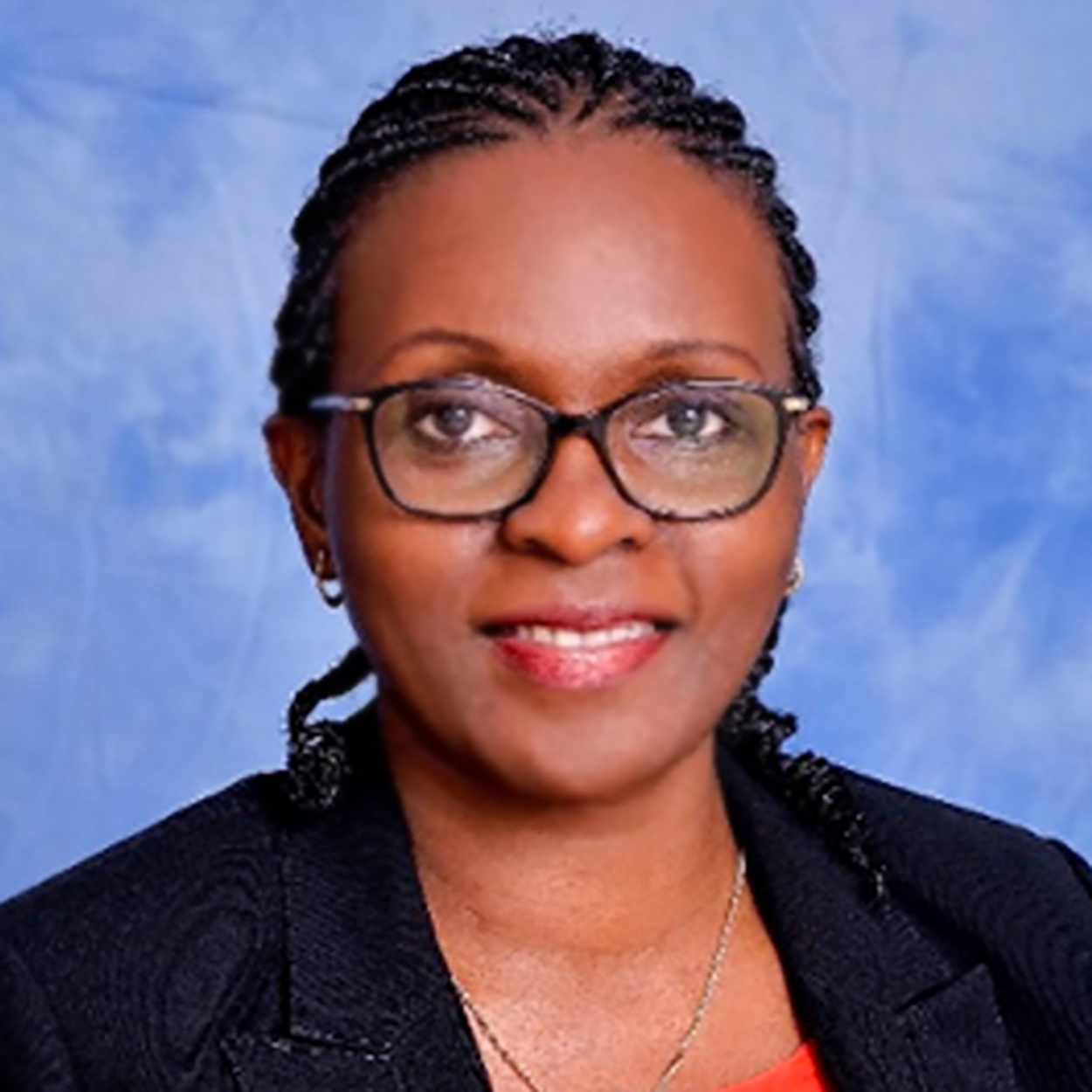
Mukumbya is the new executive director of ADC
Josephine Mukumbya has been appointed as the executive director of Agribusiness Development Centre (ADC); an entity which was founded by Rabo Foundation and dfcu Limted to specialise in capacity development of farmer based organisations through training, business mentorship and coaching, offering them the prospect of a sustainable future.
Mukumbya will be responsible for providing strategic leadership for growth of the overall organisation, its partners and the agribusinesses working with ADC.
She holds a Master’s Degree in Banking and Finance for Development from the Fondazione Giordano Dell ‘Amore in Italy and is a certified coach credentialed by the International Coach Federation as an Associate Certified Coach.
Mukumbya is an experienced professional in governance, risk management, business planning, financial portfolio management, capacity development, coaching and working cross culturally.
She has a proven track record of superior performance in five financial institutions, an International Development Agency and a multi- donor funded social enterprise in varied roles.
How trust enhances team performance
Building trust in the workplace contributes to more than just company culture it is a hard economic driver. Studies have shown that high-trust organisations are more likely to be high-performing revenue companies when compared to their low-trust counterparts.
It takes time to establish a high level of trust amongst employees, and even longer to fix a trust issue. Here is how you can help create a culture where employees feel safe, supported and respected, and in turn, respect and support you and the business.
Empower staff
Mutual trust and respect are built through reciprocity. Employees who feel trusted will trust you more. That is why it is important to empower your team by regularly giving away your authority. Delegate responsibilities to individuals and encourage a collective team decision-making process whenever possible.
Commit with actions
“Do what you say and say what you do.” Going back on your word is a sure-fire way to create doubt and break your team’s trust, fast. However, if you practice what you preach, employees will believe you are reliable and true to your word, and trust in your leadership. Building trust as a leader is done one step, one conversation and one action at a time.
Don’t make grand promises to employees in the hopes of pleasing or showing off to them as a way to build trust. Instead, focus on committing to key actions and delivering on them.
Encourage authentic communication
Even the best leaders fail. The difference between trustworthy leaders and others lies in their response to failure. If you try to hide mistakes from your team, they will feel like you do not trust them with important information or even worse, that you do not respect them enough to tell them the truth. Being authentic, vulnerable and transparent with your team helps build your credibility and humanises you. Own your mistakes and tackle difficult issues in a timely manner. Be clear on what went wrong, what could have been done better and highlight how you’ll improve next time.
Praise publicly, correct privately
An essential component of trust is a feeling of psychological safety. If your employees feel you will throw them under the bus or humiliate them in front of their peers, they will be less likely to trust you as a leader and might even lie to avoid getting caught out in the future. Commend employees on what they did well.
If a project did not go as planned and you are conducting a post-mortem, adopt a constructive approach problem-solving; “What can we do better next time?” Rather than pointing fingers at specific team members or resorting to blame. This fosters a feeling of support and trust in your team.

SOMA, an e-leaning solution for farmers
By Katia Mugenzi
The Agribusiness Business Development (ADC) powered by DFCU bank and Rabo Foundation offers Farmer Based Organizations (FBOs) trainings in good governance, financial literacy, marketing, and price risk management. ADC has trained 114 Farmer Based Organizations (FBOs) with over 8042 farmers in the East, West, Central and Northern region. Our goal is to train 375 Farmers Based organizations by 2022; with SOMA, we shall be able to reach our goal.
SOMA is an eLearning platform which was developed based on an identified learning gap; mismatch between demand of learning services and the capacity of the ADC to match this demand in the physical and high cost of carrying out one on one classroom trainings for each individual farmer. Developing the eLearning is an opportunity to bridge the gap between demand and supply of the ADC technical services at a cost-effective way. It is designed to be a self-based learning where members can access the system, register for accounts, and choose any courses they may wish to learn and gain skills on.
With SOMA we shall be able to render a unique learning experience to users through a variety of content mainly in the categories of video, graphics, audio, and text. We plan to reach over 10,000 + farmers remotely by 2022.
SOMA will give the farmers the opportunity for education without the restrictions of time or location. This is going to solve the challenge of gender imbalance since most women miss the lessons due to other home obligations. Furthermore, some learners prefer working at their own pace and prefer not to restrict their learning to a specific location, this will help the farmers save on transport to go to learning centers.
ADC’s long plan is to establish learning centers or hubs in different Farmer Based Organizations (FBOs) where farmers can be able to come take lessons in their own time of convenience. When a farmer registers for a lesson and starts learning, the system offers the learner resume capabilities that is; they can always stop and later continue from where they last stopped.
The other uniqueness of SOMA is that it offers a certificate for each course completed. The fact that most of the farmers we are training are semi illiterate; this is also a motivation for them to complete these lessons. A farmer who has completed these lessons is at an advantage of being able to do business with financial Institutions, buyers, and processors.
It goes without mention that the COVID 19 has compelled most business to include technology in their activities, farmers are the back bone of this country therefore there is need for them to adopt real quick and ADC is here to support them.
To access the platform, go to www.soma.adc.ug or email us for assistance info@adc.ug

The realities of eLearning for Agriculture in Uganda
By Priscilla Basemera
At 10 am, on the bright Wednesday morning of 29th July, Agribusiness Development Centre (ADC) at their offices on Plot 1 Mackinnon Road, launched SOMA, the first e-learning platform of its kind in Uganda with a press conference.
There are a few e-learning options available for agriculture professionals predominantly in the United States and in some parts of Asia but not in Uganda. Internet searches for e-learning platforms provide search results to student learning portals but not farmer knowledge.
SOMA, a self-paced online portal has been developed and tailored to the needs of individual farmers and farmer-based organizations. The General Manager of ADC, Emmanuel Obuko, during the launch remarked that with the low literacy levels in Uganda, adapting technology in agriculture has been difficult.
DRIVING FARMER LITERACY
Agricultural development in a changing world is not only dependent on constantly improving existing practices but also on the adoption of innovations like SOMA.
SOMA takes into consideration the different possibilities e-learning has to offer. It incorporates allowing learners an opportunity to access the available courses within their respective geographical locations at a time convenient for them at no cost. With agriculture being Uganda’s most important export sector, several factors including limited availability of finance, lack of access to timely and quality market information as well as poor agricultural practices to mention but a few are an obstacle. ADC, with a desire of training farmers in becoming self-sufficient developed SOMA to provide knowledge in areas such as Good Governance, Financial Literacy and Marketing.
WHY FARMERS?
ADC was established in 2017 by Rabo Foundation, a Netherlands based organization and Dfcu Bank in Uganda. With agriculture being the backbone of Uganda and employing 70% of Ugandans, the ADC through training aims to support farmer-based organizations in becoming self-sufficient and bankable. In a means to create professional development opportunities for agriculture practitioners, ADC creates innovative ideas that are effective and efficient for farmers in Uganda to earn a living enough to sustain their families as well.
The first steps of e-learning in agriculture have been taken in countries like Asia by the Asia – Pacific Regional Technology Centre (APRTC) in Thailand. Fully exploiting electronic media and maximizing its usefulness while creating a well-designed electronic training system for learners.
The online programs available on SOMA are designed to engage the learners and avail learning resources in the form of case studies for their benefit. Lessons are available in English, Luganda, Luo, and Runyakitara. The choice is simply yours.
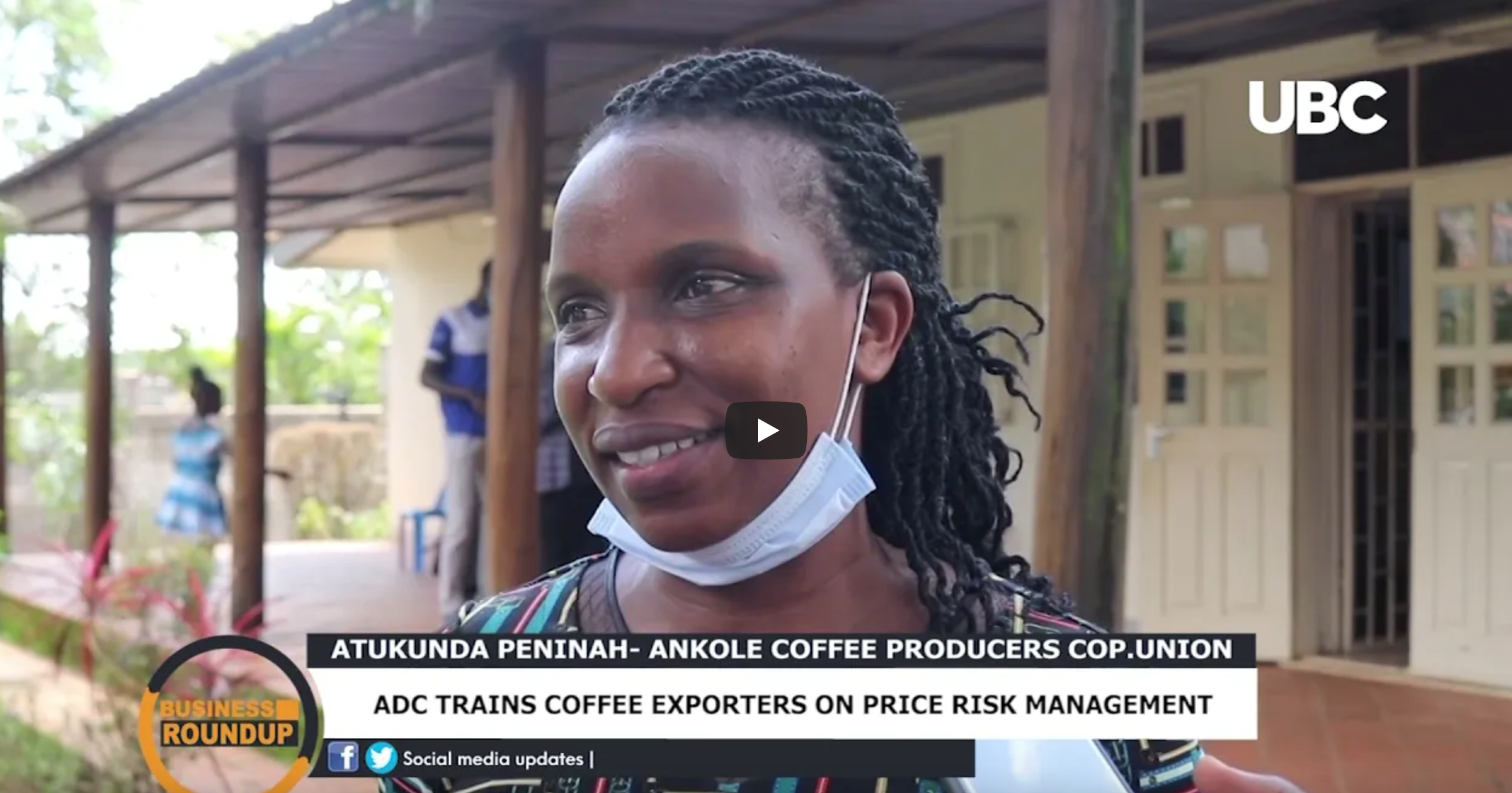
Coffee Exporters Learning to Manage Pandemic Pricing at ADC
Agribusiness Development Centre updated their Price Risk Management Training to impart Ugandan coffee farmers and exporters with more knowledge. In the video, Price Risk Management(PRM) Participants (coffee farmers) share their challenges and how they plan to overcome them using the knowledge from PRM.
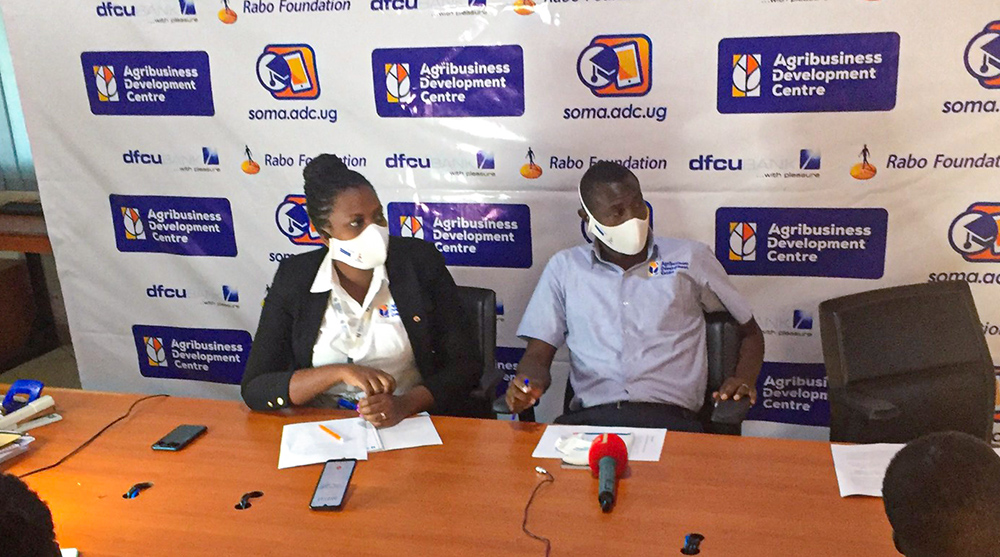
Maximization of online opportunities with SOMA Digital Campaign
By Priscilla Basemera
With the existence of the global pandemic COVID-19 and its impact on business activities, Agribusiness Development Centre (ADC) utilized the internet as a link to farmers, farmer-based organizations (FBOs) and the general public who have been spending most of their time at home and on their smartphones.
Online channels have been an ideal way of raising awareness of activities that businesses are indulging in during the ongoing pandemic. ADC through a digital campaign labeled “Register to Win” launched SOMA, an e-learning platform specific to agribusiness on its social media channels Facebook, Twitter and Instagram. SOMA can be accessed on www.soma.adc.ug.
The main aim of this campaign was to encourage people to sign-up for lessons on the SOMA platform. The 1st 10 people to register each week were hosted at the ADC offices in Kampala on Plot 1 Mackinnon Road for an interaction with the ADC Team and in appreciation of their efforts parted with a gift hamper. This campaign ran for 4 weeks bringing in a total of 40 winners.
From the 40 winners, only 14 were within Kampala during the campaign and shared their experience with SOMA upon their visit to the ADC offices. These 14 winners comprised of students, farmers, teachers and businessmen to mention but a few.
At this gathering, the ADC Team was represented by the Ag. General Manager, Emmanuel Obuko; Head of Communication and Marketing, Katia Mugenzi and Software Engineer, William Ssenyondo who developed the SOMA platform.
To catch a glimpse of what some of the winners had to say about SOMA, visit https://youtu.be/xLfY7k_1zH8

CONGRATS TO OUR WINNERS.
We thank you for registering and participating in our digital campaign.
- Richard Musamali, Kampala
- Rwabyerwa Jimmy, Fortportal
- Angus Nassasira, Kiwatule
- Stephen Ifulaimu Hiire, Kabale
- Weere Asuman,Mbale
- Musinguzi Norman, Muyenga
- Martijn Harlaar, Kampala
- Dick Midamba, Gulu
- Kwagala Phoebe, Kampala
- Dennis Chesang, Kpachorwa
- Francis Mugisha, Mbarara
- Bryan Timothy, Lyantonde
- Apio Angella Josephine, Makerere
- Ronald Babikanyisa, Kansanga
- Dan Busobozi, Mukono
- Patrick Kato, Kisasi
- Ampaire Dick, Kabale
- Julius Izza Tabi, Arua
- Katungi Cyprian Junior, Kampala
- Samuel Okello, Gulu
- Katana Daniel, Kiryandongo
- Adong Patricia, Lira
- Derrick Rubaramira, Bugolobi
- Henry Samuel Mwesigwa, Mukono
- Alexander Ruhweza, Kampala
- Nkesiga Esau, Nsambya
- Aloysius Ssendegeya, Wandegeya
- Kristina Victoria Nnanyange, Kyengera
- Mutai Evans, Bukwo
- Kisa Lawrence, Lira
- Marion Musingunzi, Nalya
- Jonathan Kyanda, Fortportal
- Daisy Anne Namono, Mukono
- Kubiriba Asaph Nahabwe, Ntungamo
- Nathan Ssebunya, Kawanda
- Sserunkuma Moses, Kawempe
- Asuman Jahazi, Gayaza Road
- Wanume Paul, Kamuli
- Stephen Magambo, Kawempe
- Rwomithio Brian, Naguru


